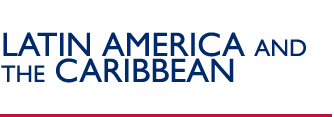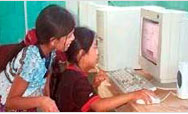
Photo: PADF by Karl Grobl
Beneficiaries from an Alternative Development project located in the municipality of Trinidad in the north-central department of Cordoba prepare palm seedling for planting. USAID’s alternative development activities have supported roughly 135,000 families with licit economic opportunities.
Colombia Snapshot
Date of independence: 1810
Population: 44.38 million
Income per person: $2,976 (yr)
USAID in Colombia
http://colombia.usaid.gov
|
CONTACT INFORMATION
Mission Director:
Susan Reichle
American Embassy Bogota, USAID 510
APO AA 34038-3030
Tel: (571) 315-0811 Ext. 4125
Colombia Desk Officer:
Laura McKechnie
Tel: 202-712-1247
E-mail: LMckechnie@usaid.gov
|
|
Overview
 Rich in natural resources and with a long history of democracy, Colombia’s development challenges are exacerbated by decades of violence fueled by widespread illicit crop production and narco-trafficking. Numerous rural municipalities, isolated by poor infrastructure and fragile institutions, remain prone to aggression from illegal armed groups, illicit crop cultivation, forced displacement, and human rights abuses. Approximately half of Colombia’s citizens live below the poverty line, suffering from severe income disparities, poverty, and inadequate social services. The Government of Colombia (GOC) is exerting significant pressure on the illegal armed groups, but their presence and propensity to violence continue to pose a threat. The GOC is working hard to consolidate a legitimate state presence throughout the country, revitalizing the Colombian economy and combating corruption. Rich in natural resources and with a long history of democracy, Colombia’s development challenges are exacerbated by decades of violence fueled by widespread illicit crop production and narco-trafficking. Numerous rural municipalities, isolated by poor infrastructure and fragile institutions, remain prone to aggression from illegal armed groups, illicit crop cultivation, forced displacement, and human rights abuses. Approximately half of Colombia’s citizens live below the poverty line, suffering from severe income disparities, poverty, and inadequate social services. The Government of Colombia (GOC) is exerting significant pressure on the illegal armed groups, but their presence and propensity to violence continue to pose a threat. The GOC is working hard to consolidate a legitimate state presence throughout the country, revitalizing the Colombian economy and combating corruption.
As a partner in Colombia, the U.S. Government (USG), through USAID, supports GOC efforts to achieve peace, promote economic prosperity, improve the living conditions of Colombia’s most vulnerable groups, develop economic and social alternatives to illicit crop production, and strengthen the presence and effectiveness of the state.
Programs
Alternative Development
USAID/Colombia’s Alternative Development (AD) Program supports GOC efforts to strengthen the licit economy through productive projects, enterprise development, natural resource protection, institutional strengthening, and promoting access to markets. The Program works with the private sector to expand economic opportunities providing long term alternatives to illicit crop production. At the local level, the goal is to improve effectiveness of municipal governments, expand access to markets, and promote growth in targeted regions. To date, USAID AD activities have supported the cultivation of over 158,000 hectares (390,382 acres) of licit crops.
In addition, USAID works with the GOC to facilitate the creation and effective implementation of modern laws and policies to promote trade and strengthen economic competitiveness.
Democratic Governance
USAID’s Democratic Governance Program assists the GOC as it combines broader and fairer justice with more representative and responsive governance, particularly to address the needs of traditionally underserved regions and populations such as Afro-Colombians and the indigenous. The program is implemented through four comprehensive and inter-related activities: human rights, justice, regional governance consolidation program, and political processes strengthening
Human Rights:
Working with local government institutions and civil society organizations, USAID’s human rights activities focus on protection, prevention, and response.
Justice:
USAID supports a major initiative to transform the Colombian judicial system from a mixed inquisitorial/accusatory system, to a modern, fully accusatorial one, thus ensuring greater fairness, timeliness and equity. In addition, the Program enables citizens to access justice and conflict resolution services, free-of-charge, through 45 Justice Houses located nationwide.
Regional Governance Consolidation:
USAID works with the GOC and civil society to expand state presence and enhance citizen participation, governmental accountability, and transparency in areas that have been particularly hard hit by violence such as Bajo y Medio Atrato, Sierra Nevada, and Catatumbo.
Political Processes Strengthening:
The purpose is to strengthen Colombia’s ability to implement political reforms that increase democratic inclusion and competition among political parties in the country.
Internally Displaced Persons (IDPs) And Vulnerable Groups
Working with the GOC, USAID provides social and economic development opportunities to approximately three million Colombians who have been displaced by the conflict. The GOC also receives direct support for IDPs from the Department of State’s Office of Population, Refugees, and Migration (PRM) and USAID. PRM provides funding for emergency assistance to families and individuals during their first 90 days of displacement. Once this emergency phase has concluded, USAID’s program provides medium- and longer-term assistance to displaced families until they can return to their homes or be resettled.
Since 2001, USAID’s activities have focused on meeting the basic needs of the displaced and other vulnerable groups by expanding access to health care, shelter, education, water and sanitation, psychosocial programs and income generation opportunities.
Demobilization and Reintegration
In November 2003, the GOC began implementing a collective demobilization process for paramilitary fighters. USAID supports this effort through four interrelated activities: effective legal processing and monitoring of ex-combatants, verification of the demobilization and reintegration process, support for reconciliation and reparations of victims, and reintegration of ex-combatants. Through this last component, USAID has approved nearly 50 projects to benefit 20,000 ex-combatants and receptor communities’ citizens.
|


